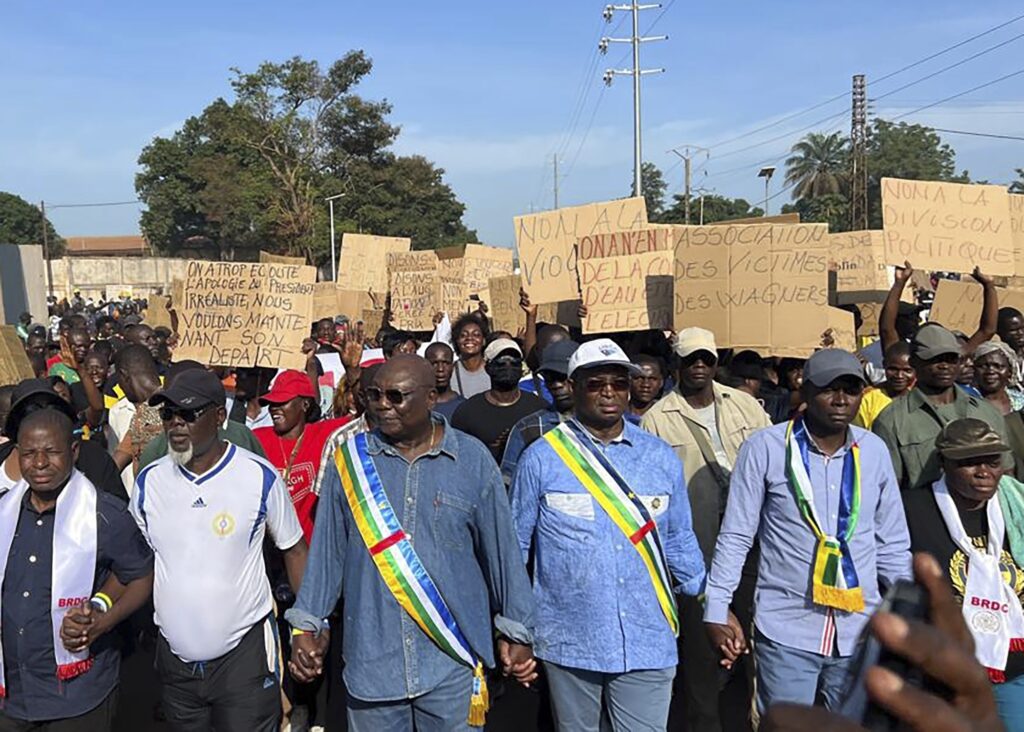Recent protests in the Central African Republic (CAR) could have the government reconsidering its relationship with the Russian Ministry of Defense.
Thousands of people held signs and marched in the streets of the capital, Bangui, on April 4 to rally against the ongoing presence of Russian Wagner Group mercenaries who have guarded President Faustin Archange Touadéra.
Wagner fighters have acted as Touadéra’s personal security detail since 2018. They helped him change the constitution by referendum in July 2023, which allows him to stay in power indefinitely.
“We’re here to say no to a third term for Faustin Archange Touadéra. But more than that, we want to protect our sovereignty, which Touadéra and the Wagner have trampled upon,” opposition member Justin Winè told The Associated Press. “The Wagner have raped and killed without any justice. This is not normal. To put an end to their reign, Touadéra must go.”
Experts say the recent wave of protests exemplifies an increasing sense of public outrage at the illicit activities and influence of Russian mercenaries.
“Sparked by reports of arbitrary killings, sexual violence and looting by Wagner fighters, these demonstrations highlight a broader crisis: the normalization of war crimes and impunity for violence against civilians,” the Robert Lansing Institute for Global Threats and Democracies Studies wrote in an April 7 report.
It described Russia’s actions in Africa as “a form of neocolonial policy,” using mercenaries, extractive companies, propaganda and state capture to control natural resources, exert political influence and compromise the state security apparatus.
Wagner reportedly generates hundreds of millions of dollars a year from diamond and gold mining, timber harvesting, and weapons trafficking in the CAR.
“While the Kremlin often presents itself as an anti-colonial partner to African states, its actions reflect core characteristics of classical colonial behavior,” the Lansing Institute wrote. “It is neocolonialism without the flag, but with all the core components: domination without development, order without justice and sovereignty without autonomy.”
The Russian Ministry of Defense has insisted that Touadéra sign a contract to gradually replace the Wagner Group with the Africa Corps, which it controls. The contract stipulates the payment of $15 million per month as “service costs,” the website Africa Intelligence reported on July 21.
The monthly payments would make up nearly 40% of the CAR’s budget for 2025. The Kremlin reportedly is inflexible and is demanding that the contract be signed by the end of August.
“Bangui is highly skeptical of the operation to replace Wagner, both financially and in terms of security,” Africa Intelligence wrote. “Some Wagner personnel are expected to be transferred to the Africa Corps contingents, but new paramilitaries will be deployed, and doubts remain about the leadership team.”
Throughout its time in the CAR, Wagner frequently has been accused of massacres, extrajudicial killings, rape, torture and rights abuses with impunity.
On the night of July 16, 11 people were killed at the Wagner-controlled Ndassima mine, about 300 kilometers northeast of Bangui. About 3 kilometers away, in Djoubissi village, resident Serge Pounematchi said his son was among the victims who were at the site searching for gold residue when they were killed.
“It is a shame that the right to life does not exist,” he told AP.
The pattern of Wagner Group atrocities also figures into Touadéra’s decision on entering into a deal with Russia’s Africa Corps.
“The number of victims of Wagner human rights abuses continues to increase,” Jelena Aparac, former head of the United Nations working group on mercenaries, told RadioLiberty for a March 28 article. “[Regrettably] there are no coordinated investigations and [no] effective accountability.”
Instead of security or justice, the people are brutalized and intimidated routinely, said Charles Bouessel, a CAR expert with the Crisis Group think tank.
“Terror is used as a weapon because Wagner and [the military] may not have enough forces to be present everywhere on the ground,” he told RadioLiberty.
The Lansing Institute’s report concluded that Russian mercenaries deliberately target civilians as a tactic to control territory and resources. As a result, public opinion is shifting, and Touadéra’s rule is increasingly seen as illegitimate.
“Wagner employs violence not just for military gain but as a psychological weapon,” it wrote. “Intimidation ensures compliance from both governments and local populations. The protests in CAR are not just about Wagner — they are a cry against a broader system of foreign predation, impunity and betrayal by national elites.”

